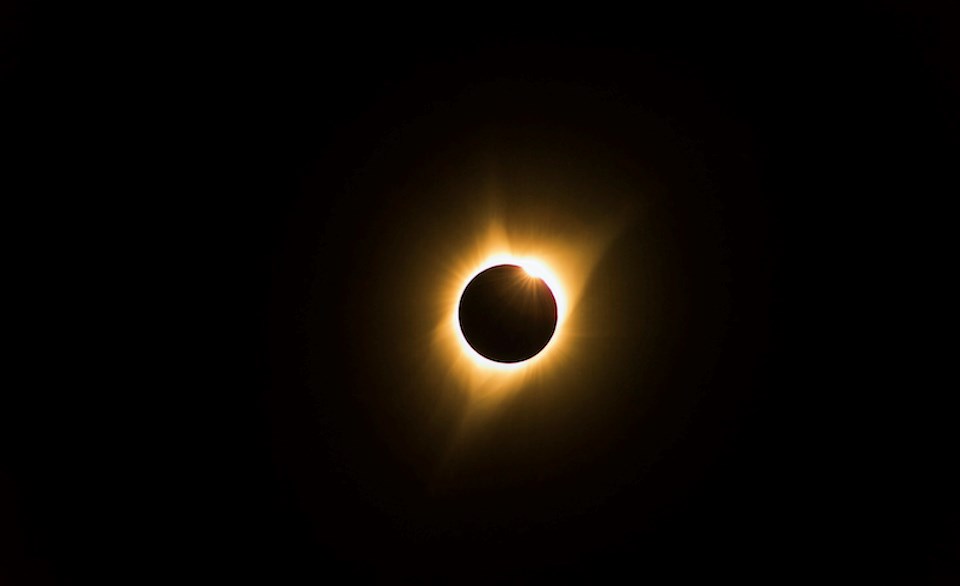APRIL 8 UPDATE: Rain and clouds will dampen Metro Vancouver's chances of seeing the eclipse in local skies. Live streaming events will offer the best viewing of the exciting event. Original story follows below.
Skywatchers in cities across North America will see the sky go completely dark during the day on Monday, April 8 during a total solar eclipse.
But Metro Vancouverites won't see the full scope of the rare event. Locally, only about 17 per cent of the sun will be covered, according to H.R. MacMillan Space Centre astronomer Marley Leacock.
Locals are more likely to see a "crescent 'cut out'" move across the sun when the eclipse reaches its peak. In other parts of the continent, the moon will block out the light from the sun, creating an eerie mid-day darkness.
Since the moon will never completely block the sun in Vancouver, it is unsafe for locals to observe the event without protective eyewear at any point during the eclipse.
NASA advises using a camera lens, binoculars, or a telescope with a special-purpose solar filter secured over the front of the optics to view and/or photograph the event.
Regular glasses or sunglasses will not protect your eyes from sun damage. Use solar viewing glasses (eclipse glasses) or a safe handheld solar viewer. NASA notes that "safe solar viewers are thousands of times darker and must comply with the ISO 12312-2 international standard."
If the weather cooperates, people along the "path of totality will see the sun’s corona, or outer atmosphere, which is usually obscured by the bright face of the sun," according to NASA.
What time is the solar eclipse in Vancouver?
In Vancouver, the partial solar eclipse will start at 10:43 a.m. on April 8 and reach its maximum coverage (17 per cent) at 11:30 a.m. The event will finish at 12:20 p.m. (view slide two for viewing details).
The total event will last one hour and 37 minutes.
The eclipse will start over the Pacific Ocean and then pass across continental North America. The first place that will experience totality is Mexico’s Pacific coast at around 11:07 a.m. The path of totality will then enter the United States through Texas, making its way into numerous states including Oklahoma, Pennsylvania, New York, and Maine, as well as Canadian provinces including Quebec, New Brunswick, Prince Edward Island, and Nova Scotia.
The eclipse will "exit continental North America on the Atlantic coast of Newfoundland, Canada, at 5:16 p.m.," according to NASA.
NASA has a map that shows what areas will see the eclipse in totality. Anyone in the path of totality will have a chance to see the total eclipse, weather permitting (see slide three).
Can I view the solar eclipse in Vancouver if the weather is poor?
Outdoor viewing opportunities are also weather-dependent; the event won't be visible in Vancouver if it rains or there is significant cloud coverage.
Environment Canada's online cloud prediction tool for astronomical purposes shows how clear the sky might be throughout the day.
Weatherhood also offers neighbourhood-specific forecasts for over 50 locations across the Lower Mainland to help plan your eclipse viewing.
NASA will be streaming the total solar eclipse on its website for people who want to see it pass through the path of totality.
Solar eclipse public viewing at the University of British Columbia (UBC)
Researchers at the UBC Department of Physics and Astronomy will host a public solar eclipse viewing event outside the university's bookstore on Monday, April 8, weather permitting. If the weather is bad, the event will be held in the UBC Robert H. Lee Alumni Centre lobby.
To safely view the eclipse, attendees can borrow eclipse-viewing glasses. The event will also feature two solar telescopes, edible pin-hole cameras for children and a live feed of NASA’s eclipse coverage.
When: Monday, April 8 from 10 a.m. to 12:30 p.m
Where: UBC Bookstore exterior - 6200 University Blvd. If the weather is bad, the event will be held at the Robert H. Lee Alumni Centre lobby (6163 University Blvd)
Cost: Free
Solar eclipse event at the Trottier Observatory
Simon Fraser University (SFU) will host a solar eclipse viewing party at the Trottier Observatory on Monday, April 8. The institution will provide solar telescopes for attendees and some solar eclipse eyeglasses for people to use.
The free event is open to people of all ages and no pre-registration is required. However, the event is weather-permitting.
When: Monday, April 8 from 10:30 a.m. - 12:30 p.m.
Where: SFU Trottier Observatory - 643A Science Rd, Burnaby
Cost: Free.
The H.R. MacMillan Space Centre eclipse viewing party
The H.R. MacMillan Space Centre will host a by-donation viewing event and have eclipse glasses available at the front desk. Weather permitting, it will have the viewing outside.
If the weather does not cooperate, the space centre will have a livestream of the event in the auditorium that will show the total solar eclipse in other parts of North America.
If you would like to watch a show in the planetarium after the eclipse tickets will be required.
When: Monday, April 8 from 10:30 a.m. - 12:30 p.m.
Where: H.R. MacMillan Space Centre - 1100 Chestnut St, Vancouver
Cost: Free, by-donation for viewing glasses.
Stay up-to-date with hyperlocal forecasts across 50 neighbourhoods in the Lower Mainland with V.I.A.'s Weatherhood.



